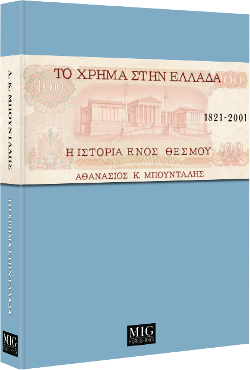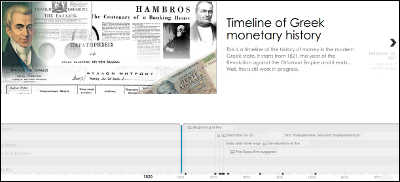Κατά κανόνα, οι σημερινοί οικονομολόγοι δεν κάνουν τον κόπο να μελετήσουν την ιστορία του χρήματος. Είναι πολύ ευκολότερο να την φανταστούν και να υποθέσουν τις αρχές αυτής της φανταστικής γνώσης Alaxander del Mar, A History of monetary systems (1901)
The Salonika congress - Young Turks and their programme (The Times, 3 Oct. 1911, p. 3)
Το πλήρες κείμενο στα αγγλικά:
THE SALONIKA CONGRESS
YOUNG TURKS AND THEIR PROGRAMME
(FROM OUR CORRESPONDENT IN THE BALKAN PENINSULA)
The Congress of the Comrmittee of Union and Progress is now sitting at Salanika. The development of the crisis provoked by the Italian seizure of Tripoli Will be, no doubt, greatly influenced by its decisions. There was a similar Congress held last year, when the delegates were invited to discuss a series of philanthropiC proposals of a non-political and unexceptionable charaCter, aiming at the spread of education, the advancement of sanitary science, the inauguration of numerous public works, and the furtherance of the general well-being of thE various populations ef Turkey. The subjectS, however, whiich actually occupied the assembly at that time seem to have had little connexion with this benevolent programme. An account of its intimate discussions, which reaches me from a highly trustworthy source, is of peculiar interest owing to the light whicih it throws on the real aims and objects of those who now guide the destinies of the Ottoman Empire.
In his inaugural speech the President congratulated the Congress on the passage of various legislative measures such as theo law for the suppression of bands, the Press law, and the law dealing with associations. Thanks to these measures, the activity of the bands, which aimed at bringing about a renewal of European intervention, had proved futile. Owing to the progress made in strengthening the army Turkey could now protect all her frontiers. Security of life and property in the interior still left much to be desired owing to insufficiency of funds for the Gerdarmerie and the dearth of Musulman recruits; it was impossible to enlist Christians, on whom no reliance could be placed.
ALBANIA AND MACEDONIA.
After referring to the successful campaigns in Albania and the Hauran, the President turned his attention to Macedonia. Here there was a marked improvement. The Powers had abandoned all idea of intervention, and as Europe always regarded the affairs of Turkey through Christian spectacles every effort must be made to crush the propaganda of the Christian nationalities, which might attract the attention of European politicians. The policy of disarmament and the boycott of Greek commerce had contributed largely to the achievement of this object, but it was necessary to strengthen further the Musulman element. Twelve thousand Bosnians had been introduced into Macedonia, and more would be brought in; the proposed settlement of immigrants from Persia, Russia, and Turkestan had been postponed for the present.
The President then dwelt on the harmony existing between the legislative and executive powers, which had only been broken by the quarrel between Mahmud Shevket and Djavid; the latter, though in the right, had been obliged to yield. Otherwise, the party remained supreme and had succeeded in strangling at birth the opposition of new groups, such as the "Liberals" and "Democrats." The existence of the Empire depended on the strength of the Young Turk Party and the suppression of antagonistic ideas. Perfect tranquillity was unattainable until Bulgarian and Greek aspirations had been finally crushed. Well armed, Turkey could keep the Balkan States at a distance and clip the wings of Nationalist tendencies, which were rife even in Albania. Greater energy must be employed against the intrigues of the neighbouring States, so that, when disarmament had been completed, when the boycott had attained its object, and when Nationalist agitators had been replaced by Moslem immigrants, the ideas of a Hellenized Macedonia, a greater Bulgaria, and an independent Albania would be forgotten. Failing this, armed force must be employed, and proof afforded that the millions devoted to the army had not been spent in vain.
In conclusion the President referred to the progress of Pan-Islamism. Enthusism had been aroused throughout the Moslem world for the Young Turks. The movement in Egypt, India, and Persia had excited distrust in England and France, but the sympathy of Moslems more than counterbalanced the alienation of Christian Powers. Turkey had gained with the Triplice what she had lost with the Entente, which had ever displayed ambitions opposed to Turkish interests, while the Triple Alliance had consistently sympathized with the new régime.
MACHINERY OF THE COMMITTEE.
A report of the work of the Central Committee was then presented. Harmonious relations existed with the various branches, but difficulties had arisen with the Committees at Monastir and Adrianople, which desired to precipitate a conflict with Bulgaria. Adrianople was eager for war, and Monastir, on its own initiative, had executed measures of great severity against the Bulgarian element. In principle the two Committees were perfectly Justified in their desire, but the Cental Committee was assured that extreme measures would be inopportune in the present circurmstances of Turkey. The demand for the election of an Arab mernber to the Central Committee could not be entertairned, only Turks being eligible. The law dealing with associations and the measures adopted against the Bashkim (Albanian) clubs were necessitated by the desire of the Greeks, Bulgarians, Albanians, and Servians to maintain separate organizations. These nationalities, it was hoped, would fall into line beside the Young Turks.
The Committee, the report proceeded, had succeeded in appointing its adherents to nearly all the most inportant posts in the Empire. Any remaining exceptions must be rectified. All important positions must be occupied by Musulmans, and only the most insignificant functions entrusted to persons of other creeds. Efforts had been made to abolish or to modify the Capitulations. In dealing with the Greeks, Bulgarians, and Servians, who endeavoured to profit by former conventions, the Young Turks had been successful; before dealing with the Great Powers they must wait till they had a million bayonets at their conmmand.
The Congress next proceeded to the election of various officers. It was reported that there were now 4,800 branches of the Comnittee, with 135,000 members. Receipts for the past year amounted to £T53,500 and expenses to £T22,450. A number of resolutions prepared by the Central Comnuittee were then adopted without discussion.
THE POLICY OF OTTOMANIZATION.
It was resolved that the disarmament of the Christians in Macedonia should be completed. Musulmans generally should retain their arms, and where they are in a minority arms should be distributed to them by the authorities. The bands must be wiped out by the army and flying columns organized for their plursuit. The new law must be rigorously applied, suspicious persons must be exiled, and a free hand given to the Gendarrnerie and troops. The military tribunals should be in constant communication with the Committee and more energetic in inflicting punishment, as too many delinquents had escaped. The settlement of 20,000 Mahomedans, involving an expenditure of ?T220,000, must be carried out on the Greek and Bulgarian frontiers. Emigration from the Caucasus and Turkestan must be encouraged, land provided for the immigrants, and the Christians prevented from purchasing property. The boycott must continue till the Powers were compelled to settle the Cretan Question, for war with Greece must not be risked till the fleet had beer strengthened. The boycott must be controlled by the Committee, the Cretan Question again raised in the Chamser, and a Moslem deputatton summoned from Crete. The anti-Bulgarian boycott having failed, its place must be taken by the expulsion of teachers, priests, and agitators. All new parties in the Chamber and the country must be prohibited and the new "Liberal" ideas opposed. Turkey was essentially a Moslem country, and Moslem ideas and influence must preponderate. All other religious propaganda must be suppressed, as no reliance could be placed on Christians, who were always working for the downfall of the new régime.
FOREIGN RELATIONS.
Sooner or later the complete Ottomanization of all Turkish subjects must be effected, but it was becoming clear that this could never be achieved by persuasion, and recourse must be had to force of arms. Moslem domination was inevitable, and respect must be preserved for Moslem institutions and traditions-the most humane in the world. Other nationalities must be refused the right of organization, for decentralization and autonomy were treachery to the Turkish Empire; these nationalities were a negligible quantity; they might retain their religion, but not their languages; the diffusion of the Turkish language was one of the principal means of assuring MIoslem predominance and assimilating other elements. Intimate relations must be established with the Moslems of Turkestan, Persia, India, the Caucasus, and Egypt, who possess common interests and a common enemy. Agents had been sent to these countries, and delegates from India and the Caucasus had arrived at Constantinople.
In regard to foreign policy, it was resolved to maintain good relations with the Balkan States, peace being necessary for the military and material development of the country. A powerful Army would enable Turkey to demand the aboltion of the Capitulations; this was more important than the reorganization of justice. The Army, when strengthened, must be employed to crush for ever the aspirations of Greece and Bulgaria. Favourable treaties should be contracted with Servia and Rumania. With regard to the Great Powers, Turkey must maintain an attitude of reserve and form no alliance till she was stronger, lest her independence be compromised. Turkey was destined to play a great rôle in both continents when the Mloslems endeavoured to shake off the foreign yoke; hence the anxiety displayed by Great Britain, Russia, and France. Too great reliance should not be placed on the Powers of the Triplice, but Turkey should maintain intimate relations with them while preserving her neutrality and declining a formal alliance. At the same time an attempt should be made to recover the sympathy of the Entente. Turkey would continue to interest herself in Persia, and will not withdraw from that country until Russia and Great Britain do likewise.
Such was tne programme of internal and foreign policy prepared by the ruling junta at Salonika and sanctioned by the Congress of last year. Will the new Assembly improve upon the work of its predecessor ? With regard to the policy of Ottomanization, it is alleged that some of the leading spirits in the Young Turk caucus have modified their views in the direction of Liberalism. The object-lesson conveyed by the outcome of the Albanian campaign has not, we are told, been disregarded, and it is realized that the concessions accorded to the Malissori must find a counterpart in more generous treatment of the other subject populations. But whether the reputed advocates of conciliation will dare to raise their voices during the forthcoming discussions is still a matter for speculation. For the present the programme of uncompromising repression holds the field.



